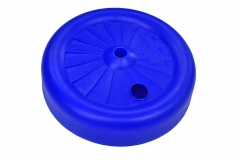Analysis of matters needing attention in blow molding processing
According to the method of making the parison, blow molding can be divided into extrusion blow molding and injection blow molding. The newly developed ones include multi-layer blow molding and stretch blow molding. What is the difference between the two structures?

Extrusion, also known as extrusion blow molding, is a method of using an extruder (extruder) to successively pass heated resin through a die to extrude a product of the desired shape. Extrusion is also sometimes used in the molding of thermosets and can be used in the molding of foamed plastics.
The advantage of extrusion blow molding is that it can extrude products of various shapes, with high production efficiency, and can be automated and continuous production; the disadvantage is that thermosetting plastics cannot be generally processed by this method, and the product size is prone to tendency.
Injection molding is also known as injection blow molding. Injection molding is a method of using an injection molding machine (or injection machine) to inject a thermoplastic melt into a mold under high pressure, and then cool and solidify to obtain a product. Injection molding can also be used for the molding of thermosets and foams.
The advantages of injection molding are that the production speed is fast, the efficiency is high, the operation can be automated, and it can form parts with complex shapes, which is especially suitable for many production. The disadvantage is that the cost of equipment and molds is high, and the liquidation of injection molding machines is difficult.
Blow molding is also called hollow blow molding or hollow molding. Blow molding is a method of inflating a hot resin parison closed in a mold into a hollow product by means of the pressure of compressed air. Blow molding includes two methods of blowing film and blowing hollow products. Film products, various bottles, barrels, jugs and children’s toys can be produced by blow molding.
For example, why can the bottle only use the blow molding process, but can use injection molding? The reason is that the inner space of the bottle is large and the mouth of the bottle is small, so the injection molding core cannot be taken out. Therefore, blow molding manufacturers sandwich the soft plastic melt in the middle of the mold and blow it to make it stick to the inner wall of the mold without using a core.